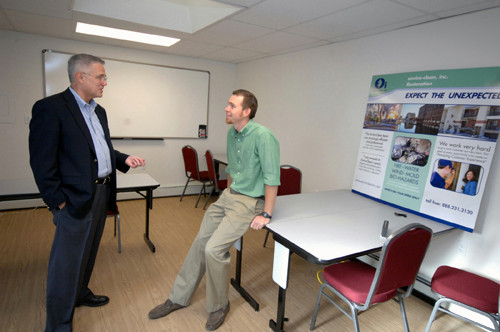
When the bedbugs bite, who you gonna call? Like just about everything else involving a cleanup, Eric Anderson is hoping it’ll be his company, Enviro-Clean, winner of the Providence Business News 2010 Business Excellence Award in the smaller-business category.
Anderson, the CEO, started the Smithfield-based company from scratch in 2002 with his father, Jack Anderson, owner of Insurance Reconstruction Inc., which the elder Anderson started nearly 30 years ago, and Tech Design/Build & Remodeling Inc.
The original mission of Enviro-Clean was to provide mold-remediation services to homeowners and businesses in Rhode Island. The following year, they added structural drying services under the trade name Water-Out of Southern New England. Since then, the scope of the company has grown dramatically in terms of breadth of services and geography, with Enviro-Clean responded to national emergencies such as hurricanes in Florida, Louisiana, Mississippi and Texas; structural drying crews from Enviro-Clean worked in the New Orleans area for three and a half months following Hurricane Katrina in 2005.
And the offerings of the company have even extended most recently into the creepy-crawly range.
“We just started a partnership with a company to do bedbug control,” Eric Anderson said. “Our clientele has asked ‘do you do bedbugs’ and now we say ‘yes.’ We’re not bug people, but we partner with pest-control people.”
The Andersons saw the need for expanding their original mission when they realized what they were doing – mold remediation – touched on so many other areas they could become involved in. Operating from two locations, Smithfield corporate headquarters and Franklin, Conn., the company’s first fully functioning satellite office, the company now offers full-service disaster recovery, including cleaning, restoration, remediation, repairs and reconstruction, as well as products for air purification, filtration, dehumidification and odor removal.
Its Large Loss Division was launched in January of this year and the Products Division this past summer.
It has all clearly worked: In the past five years, gross sales have grown to $6.7 million – more than 90 percent growth – and the number of employees has grown from 25 to 42, an increase in employment of 68 percent.
Over the company’s first three and a half years, it grew from $225,000 annual gross sales to more than $3.5 million.
The reason is relatively simple: diversification.
“We started the business as a sister company to the existing reconstruction business and were able to leverage the relationships we had in place, our clients were the same and some were similar,” Anderson said. “The other reason was our ability to diversify and adapt, realizing we can perform one service really well and then could add more services and diversification to our organization using the same channel markets.”
The channel markets – those who refer business to them, such as insurance companies, Realtors, plumbers and the like – are key to the firm’s success, Anderson said, allowing the company to grow from its original mission.
“Our first service was mold remediation, then we saw the need for water-damage repairs, and that didn’t require that much more from us, with certification and training,” he said. “We piggyback those into another type of cleaning and we continue to offer services to our existing market. It goes hand in hand. With some training and minimal capital investment, this allows us to provide more to our customers who already trust us.”
Trust is also key, he said, adding that the company is a totally “customer-focused organization, from the receptionist, to top-level management to the field technician, everyone gets the message and understands it’s always the customer first. Everyone’s job is to create a good customer experience and we do that with effective communications and documentation.”
Mark Constantine, chief operating officer, says the company has done a lot of training and reinforcement, “but I think about 80 percent of it is innate – they brought it with them. It’s not easy to find guys like that. We’re fortunate to have them.”
The company also focuses on making good employees better, Anderson said, which includes investing in their professional development through trade shows, conferences, certification courses and seminars. Weekly training is provided for technicians and field personnel on new technologies, work practices, safety and customer service. The company offers tuition reimbursement for relevant collegiate-level courses and financial assistance for those taking classes in English as a second language.
Another area of expansion in the company is one decidedly more tragic: Biomediation, involving cleaning of crime scenes, including murders. It’s a necessary evil of the business and takes a special type of worker, Anderson said.
“We just had a job involving a police officer who committed suicide,” he said. “It’s tough, we went back and forth on biomediation before we did it. It requires a certain personality, someone very compassionate with the customer but not upset by some of the scenes they go into. Our director of biomediation is that person.”
Such diversity requires a little different effort in marketing it, he said, with contacts made with the state medical examiner’s office, insurance companies, police departments and funeral directors.
“It’s more difficult and traumatic, you’ve lost a loved one and are faced with the clean up,” he said. “We’re good at it, but it’s more challenging, you have to be sensitive, you have to do more customer hand-holding.”
As a result of the channel markets the company has, they do very little outside advertising, Anderson said, relying on those markets and good word-of-mouth testimonials and referrals.
Competition exists, he said, but they use it to their advantage, calling it “comperation,” combining competition and cooperation.
“We have a few local competitors in southeastern New England, and they sub us out for work or vice-versa,” he said. “You never know when you need someone.”
And every so often, the company does best what it did initially: Drying out wet homes.
“The floods around here this spring, everyone was straight out,” Anderson said. “We had [more than] 1,000 calls in the first 36 hours, and I know some competitors shut their phones off, it was that bad. We returned every single call. Some had to wait, but we responded to them all.”
Five years ago, Anderson said, “we started to see trends in our industry that did not paint a pretty picture for the future. There were more and more competitors popping up and we could see our piece of the pie getting smaller and smaller. We knew the old ways of doing things would not hold up and that we had to change in bold, dramatic ways. That’s when we decided to try to be the very best in every aspect of our business.”
Including, it would seem, when the bedbugs bite. •












